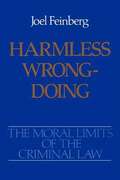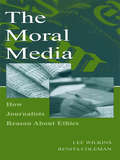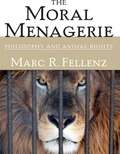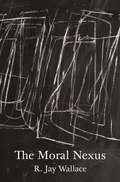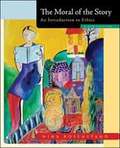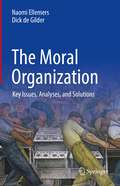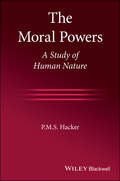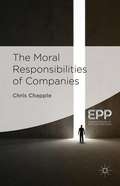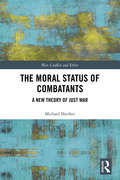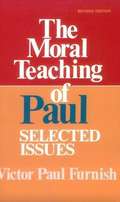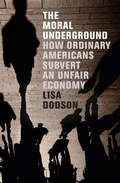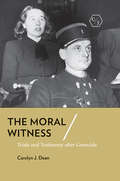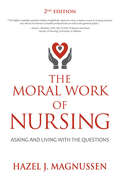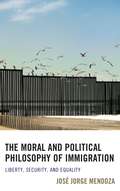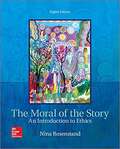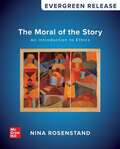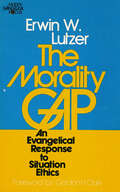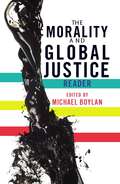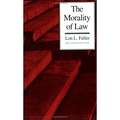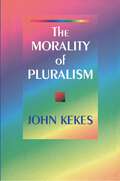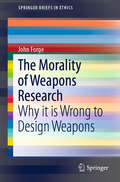- Table View
- List View
The Moral Life: An Introductory Reader in Ethics and Literature (Fifth Edition)
by Louis P. Pojman Lewis VaughnIdeal for introductory ethics courses, The Moral Life: An Introductory Reader in Ethics and Literature, Fifth Edition, brings together an extensive and varied collection of ninety-one classical and contemporary readings on ethical theory and practice. Integrating literature with philosophy inan innovative way, this unique anthology uses literary works to enliven and make concrete the ethical theory or applied issues addressed. It also emphasizes the personal dimension of ethics, which is often ignored or minimized in ethics anthologies. The readings are enhanced by chapterintroductions, study questions, suggestions for further reading, and biographical sketches. The fifth edition adds ten new readings, eight of which appear in two new chapters: Feminist Ethics and the Ethics of Care and Global Economic Justice. An updated Companion Website at www. oup. com/us/pojman provides self-quizzes, essay questions, and helpful links for students and reading summaries,a test bank, and PowerPoint-based lecture slides for instructors.
The Moral Limits of the Criminal Law: Harmless Wrongdoing (Volume Four)
by Joel FeinbergThe final volume of Feinberg's four-volume work, The Moral Limits of Criminal Law examines the philosophical basis for the criminalization of so-called "victimless crimes" such as ticket scalping, blackmail, consented-to exploitation of others, commercial fortune telling, and consensual sexual relations.
The Moral Media: How Journalists Reason About Ethics (Routledge Communication Series)
by Lee Wilkins Renita ColemanThe Moral Media provides readers with preliminary answers to questions about ethical thinking in a professional environment. Representing one of the first publications of journalists' and advertising practitioners' response to the Defining Issues Test (DIT), this book compares thinking about ethics by these two groups with the thinking of other professionals.This text is divided into three parts:*Part I includes chapters that explain the DIT and place it within the larger history of three fields: psychology, philosophy, and mass communication. It also provides both a statistical (quantitative) and narrative (qualitative) analysis of journalists' responses to the DIT.*Part II adds to scholarship theory building in these three disciplines and makes changes in the DIT that adds an element of visual information processing to the test.*Part III explores the larger meaning of this effort overall and links the results to theory and practice in these three fields. The Moral Media pursues connections among various intellectual disciplines, between the academy and the profession of journalism, and among those who believe that what journalists do is essential. As a result, this book is appropriate for aspiring journalists; scholars in journalism and mass communication; psychologists, particularly those interested in human development and behavior; and philosophers.
The Moral Menagerie: Philosophy and Animal Rights
by Marc R. FellenzThe Moral Menagerie offers a broad philosophical analysis of the recent debate over animal rights. Marc Fellenz locates the debate in its historical and social contexts, traces its roots in the history of Western philosophy, and analyzes the most important arguments that have been offered on both sides. Fellenz argues that the debate has been philosophically valuable for focusing attention on fundamental problems in ethics and other areas of philosophy, and for raising issues of concern to both Anglo-American and continental thinkers. More provocatively, he also argues that the form the debate often takes--attempting to extend our traditional human-centered moral categories to cover other animals--is ultimately inadequate. Making use of the critical perspectives found in environmentalism, feminism and post-modernism, he concludes that taking animals seriously requires a more radical reassessment our moral framework than the concept of 'animal rights' implies.
The Moral Nexus (Carl G. Hempel Lecture Series #15)
by R. Jay WallaceA new way of understanding the essence of moral obligationThe Moral Nexus develops and defends a new interpretation of morality—namely, as a set of requirements that connect agents normatively to other persons in a nexus of moral relations. According to this relational interpretation, moral demands are directed to other individuals, who have claims that the agent comply with these demands. Interpersonal morality, so conceived, is the domain of what we owe to each other, insofar as we are each persons with equal moral standing.The book offers an interpretative argument for the relational approach. Specifically, it highlights neglected advantages of this way of understanding the moral domain; explores important theoretical and practical presuppositions of relational moral duties; and considers the normative implications of understanding morality in relational terms.The book features a novel defense of the relational approach to morality, which emphasizes the special significance that moral requirements have, both for agents who are deliberating about what to do and for those who stand to be affected by their actions. The book argues that relational moral requirements can be understood to link us to all individuals whose interests render them vulnerable to our agency, regardless of whether they stand in any prior relationship to us. It also offers fresh accounts of some of the moral phenomena that have seemed to resist treatment in relational terms, showing that the relational interpretation is a viable framework for understanding our specific moral obligations to other people.
The Moral Of The Story: An Introduction To Ethics
by Nina RosenstandThe Moral of the Story, offers a remarkably effective approach that helps students understand and evaluate moral issues. Through storytelling and story analysis, using examples from fiction and film, Rosenstand brings classical moral theories to life and shows student how these theories are applied to the world around them. <P><P>The sixth edition of this text with readings has been thoroughly updated to include coverage of and examples from recent research, events, and films. It also expands the applied ethics chapter to include the additional topics of media bias, abortion, euthanasia, business ethics, and environmental ethics, in particular the issue of global warming.
The Moral Organization: Key Issues, Analyses, and Solutions
by Naomi Ellemers Dick de GilderInvestors, customers and employees increasingly expect organizations to take responsibility for the social impact of their activities. This book applies theory and research on moral psychology and social identity, to offer a new perspective on organizational social responsibility and business ethics. The authors use their unique approach to highlight recurring moral challenges in organizational behavior, such as leadership, work motivation, diversity, organizational change and stakeholder relations. Their analysis explains that people are reluctant to acknowledge and confront moral flaws in their workplace behavior, because this constitutes a source of identity threat. Common strategies to cope with this threat invite justifications and symbolic actions – and prevent moral improvement. Each chapter draws together a wealth of research findings and organizational cases. These not only identify and clarify common moral pitfalls, but also show ways to enhance the likelihood that organizations acquire the knowledge, willingness and ability to build an ethical work climate.
The Moral Powers: A Study of Human Nature
by P. M. HackerA milestone in the study of value in human life and thought, written by one of the world’s preeminent living philosophers The Moral Powers: A Study of Human Nature is a philosophical investigation of the moral potentialities and sensibilities of human beings, of the meaning of human life, and of the place of death in life. It is an essay in philosophical anthropology: the study of the conceptual framework in terms of which we think about, speak about, and investigate homo sapiens as a social and cultural animal. This volume examines the diversity of values in human life and the place of moral value within the varieties of values. Its subject is the nature of good and evil and our propensity to virtue and vice. Acting as the culmination of five decades of reflection on the philosophy of mind, epistemology, ethics, and human nature, this volume: Concludes Hacker’s acclaimed Human Nature tetralogy: Human Nature: The Categorial Framework, The Intellectual Powers: A Study of Human Nature, and The Passions: A Study of Human Nature Discusses traditional ideas about ethical value and addresses misconceptions held by philosophers, psychologists, and cognitive neuroscientists The Moral Powers: A Study of Human Nature is required reading philosophers of mind, ethicists, psychologists, cognitive neuroscientists, and any general reader wanting to understand the nature of value and the place of ethics in human lives.
The Moral Responsibilities of Companies
by Chris ChappleThe Moral Responsibilities of Companies is a philosophical analysis of the question of whether companies can be held morally responsible for the harms they create, and what implications such a view has on the moral position of employees and shareholders in these companies.
The Moral Status of Combatants: A New Theory of Just War (War, Conflict and Ethics)
by Michael SkerkerThis book develops a new contractualist foundation for just war theory, which defends the traditional view of the moral equality of combatants and associated egalitarian moral norms. Traditionally it has been viewed that combatants on both sides of a war have the same right to fight, irrespective of the justice of their cause, and both sides must observe the same restrictions on the use of force, especially prohibitions on targeting noncombatants. Revisionist philosophers have argued that combatants on the unjust side of a war have no right to fight, that pro-war civilians on the unjust side might be targetable, and that lawful combatants on the unjust side might in principle be liable to prosecution for their participation on the unjust side. This book seeks to undercut the revisionist project and defend the traditional view of the moral equality of combatants. It does so by showing how revisionist philosophers fail to build a strong foundation for their arguments and misunderstand that there is a moral difference between collective military violence and a collection of individually unjustified violent actions. Finally, the book develops a theory defending the traditional view of military ethics based on a universal duty of all people to support just institutions. This book will be of much interest to students of just war theory, ethics philosophy, and war studies.
The Moral Teaching of Paul: Selected Issues
by Victor Paul FurnishDr. Furnish enriches his discussion of key Pauline topics including: sex, marriage, divorce, homosexuality, women in the church, and the Church in the world. He pays particular attention to the socio-cultural context of Paul's ministry, the complexity of his thought, the character of his moral reasoning, and the way his thought and reasoning may inform and challenge us today.
The Moral Underground: How Ordinary Americans Subvert an Unfair Economy
by Lisa DodsonA &“fascinating&” look at the disconnect between corporate policies and workers&’ real lives—and the everyday heroes who try to help (Publishers Weekly). For the poor, there are challenges every day that they don&’t have extra money to solve: a sick kid, car trouble, an unexpected dentist bill. The obstacles can make it harder to hold on to a job—but a job loss would be catastrophic. However, there are countless unsung heroes who bend or break the rules to help those millions of Americans with impossible schedules, paychecks, and lives make it from paycheck to paycheck. This book tells their stories. Whether it&’s a nurse choosing to treat an uninsured child, a supervisor deciding to overlook infractions, or a restaurant manager sneaking food to a worker&’s children, middle-class Americans are secretly refusing to be complicit in a fundamentally unfair system that puts a decent life beyond the reach of the working poor. In this tale of a kind of economic disobedience—told in whispers to Lisa Dodson over the course of eight years of research across the country—hundreds of supervisors, teachers, and health care professionals describe intentional acts of defiance that together tell the story of a quiet revolt, of a moral underground that has grown in response to an immoral economy. It documents a whole new phenomenon—people reaching across America&’s economic fault line—and provides an account of the human consequences and lives behind the business-page headlines. &“If only this book had been published in 2007. Then the hundreds of people interviewed by Lisa Dodson would have been able to pass along an important piece of advice: What&’s good for business is not necessarily good for America.&” —Time
The Moral Witness: Trials and Testimony after Genocide (Corpus Juris: The Humanities in Politics and Law)
by Carolyn J. DeanThe Moral Witness is the first cultural history of the "witness to genocide" in the West. Carolyn J. Dean shows how the witness became a protagonist of twentieth-century moral culture by tracing the emergence of this figure in courtroom battles from the 1920s to the 1960s—covering the Armenian genocide, the Ukrainian pogroms, the Soviet Gulag, and the trial of Adolf Eichmann. In these trials, witness testimonies differentiated the crime of genocide from war crimes and began to form our understanding of modern political and cultural murder.By the turn of the twentieth century, the "witness to genocide" became a pervasive icon of suffering humanity and a symbol of western moral conscience. Dean sheds new light on the recent global focus on survivors' trauma. Only by placing the moral witness in a longer historical trajectory, she demonstrates, can we understand how the stories we tell about survivor testimony have shaped both our past and contemporary moral culture.
The Moral Work of Nursing: Asking and living with the questions
by Hazel J. MagnussenReviewing and integrating lived experiences in nursing with theory and research, The Moral Work of Nursing is a blend of life story and overview of factors affecting ethical nursing practice during the past 50 years. Reflecting on her 35-year nursing career, studies in health care ethics in the 1980s and recent developments in Canadian health care, Magnussen invites readers to ponder moral questions about the work of nurses in community, hospital and long term care settings. Nurses’ moral work requires reflection on practice, sensitivity to moral issues, courage to ask questions and take action when patient care is compromised. When concerns are not taken seriously, and systemic or other constraints make it difficult or impossible to act morally, nurses experience moral distress. They are torn between their professional commitment to safe, competent, compassionate and ethical care for patients/clients, and their personal responsibility to remain healthy and fit to practice in ever-changing health care environments.
The Moral and Political Philosophy of Immigration Liberty, Security, and Equality
by José Jorge MendozaIn The Moral and Political Philosophy of Immigration: Liberty, Security, and Equality, Jose Jorge Mendoza argues that the difficulty with resolving the issue of immigration is primarily a conflict over competing moral and political principles and is thereby, at its core, a problem of philosophy. Establishing the necessity of situating the public debate on immigration at the center of philosophical debates on liberty, security, and equality, this book brings into dialog various contemporary philosophical texts that deal with immigration to provide some normative guidance to future immigration policy and reform. As a groundbreaking work in social and political philosophy, it will be of great value not only to students and scholars in these fields, but also those working in social science, public policy, justice studies, and global studies programs whose work intersects with issues of immigration.
The Moral of the Story: An Introduction to Ethics
by Nina RosenstandNow in its eighth edition, The Moral of the Story continues to bring understanding to difficult concepts in moral philosophy through storytelling and story analysis. From discussions on Aristotle’s virtues and vices to the moral complexities of the Game of Thrones series, Rosenstand’s work is lively and relatable, providing examples from contemporary film, fiction narratives, and even popular comic strips. The Connect course for this offering includes SmartBook, an adaptive reading and study experience which guides students to master, recall, and apply key concepts while providing automatically-graded assessments.
The Moral of the Story: An Introduction to Ethics
by Nina RosenstandThe Moral of the Story continues to make difficult concepts in moral philosophy comprehensible through storytelling and story analysis. To help students apply moral theories to the world around them, each chapter concludes with a section of Primary Readings with excerpts from classical and contemporary texts, along with a selection of Narratives, stories that illustrate the moral issues raised in the chapter. Study questions are included throughout. New examples from popular culture, current events, and television shows and movies (e.g. The Last of Us, Black Mirror) are examined to explore chapter themes and reinforce the daily relevance of the moral and ethical questions that are raised.
The Morality Gap: An Evangelical Response to Situation Ethics
by Erwin W. LutzerWith the conviction that "the gap between traditional morality and the avant-garde approach is widening," Erwin W. Lutzer offers this precise, easy-to-understand, and knowledgeable critique of situation ethics.This presentation adds new insights to the discussion of morality and the ethic of love. Lutzer pinpoints the fallacies of the situationalist's philosophy and offers a biblical alternative that clearly recognizes and deals with moral conflicts.
The Morality Gap: An Evangelical Response to Situation Ethics
by Erwin W. LutzerWith the conviction that "the gap between traditional morality and the avant-garde approach is widening," Erwin W. Lutzer offers this precise, easy-to-understand, and knowledgeable critique of situation ethics.This presentation adds new insights to the discussion of morality and the ethic of love. Lutzer pinpoints the fallacies of the situationalist's philosophy and offers a biblical alternative that clearly recognizes and deals with moral conflicts.
The Morality and Global Justice Reader
by Michael BoylanThis cutting-edge volume of original essays features a diverse, international team of prominent scholars examining issues of morality and justice within a global perspective. The chapters are grouped according to an integrative design that progresses from normative principles to normative theories to normative applications. Applications chapters address current significant and provocative topics such as poverty and the global economy; global health; religion; war; and gender, identity, and family. Distinguished philosopher and volume editor Michael Boylan provides a unifying introduction to each section. In addition, an abstract and list of key words provide readers with an informative entry into each reading. An engaging resource for all students of philosophy and politics, The Morality and Global Justice Reader not only offers an essential foundation of global justice and its policy implications, but also aims to inspire readers to positive action for change. A single-authored volume by Michael Boylan, Morality and Global Justice: Justifications and Applications, is also available as a complementary or a standalone text.
The Morality and Global Justice Reader
by Michael BoylanThis cutting-edge volume of original essays features a diverse, international team of prominent scholars examining issues of morality and justice within a global perspective. The chapters are grouped according to an integrative design that progresses from normative principles to normative theories to normative applications. Applications chapters address current significant and provocative topics such as poverty and the global economy; global health; religion; war; and gender, identity, and family. Distinguished philosopher and volume editor Michael Boylan provides a unifying introduction to each section. In addition, an abstract and list of key words provide readers with an informative entry into each reading. An engaging resource for all students of philosophy and politics, The Morality and Global Justice Reader not only offers an essential foundation of global justice and its policy implications, but also aims to inspire readers to positive action for change. A single-authored volume by Michael Boylan, Morality and Global Justice: Justifications and Applications, is also available as a complementary or a standalone text.
The Morality of Happiness
by Julia AnnasAncient ethical theories, based on the notions of virtue and happiness, have struck many as an attractive alternative to modern theories. But we cannot find out whether this is true until we understand ancient ethics--and to do this we need to examine the basic structure of ancient ethical theory, not just the details of one or two theories. In this book, Annas brings together the results of a wide-ranging study of ancient ethical philosophy and presents it in a way that is easily accessible to anyone with an interest in ancient or modern ethics. She examines the fundamental notions of happiness and virtue, the role of nature in ethical justification and the relation between concern for self and concern for others. Her careful examination of the ancient debates and arguments shows that many widespread assumptions about ancient ethics are quite mistaken. Ancient ethical theories are not egoistic, and do not depend for their acceptance on metaphysical theories of a teleological kind. Most centrally, they are recognizably theories of morality, and the ancient disputes about the place of virtue in happiness can be seen as akin to modern disputes about the demands of morality.
The Morality of Law Revised Edition
by Lon L. FullerIn this new edition, of The Morality of Law the first four chapters have been reprinted from the type as it was originally set, with only a minor correction or two. The only change of substance consists, therefore, in the addition of a fifth and final chapter entitled "A Reply to Critics."
The Morality of Pluralism
by John KekesControversies about abortion, the environment, pornography, AIDS, and similar issues naturally lead to the question of whether there are any values that can be ultimately justified, or whether values are simply conventional. John Kekes argues that the present moral and political uncertainties are due to a deep change in our society from a dogmatic to a pluralistic view of values. Dogmatism is committed to there being only one justifiable system of values. Pluralism recognizes many such systems, and yet it avoids a chaotic relativism according to which all values are in the end arbitrary. Maintaining that good lives must be reasonable, but denying that they must conform to one true pattern, Kekes develops and justifies a pluralistic account of good lives and values, and works out its political, moral, and personal implications.
The Morality of Weapons Research: Why it is Wrong to Design Weapons (SpringerBriefs in Ethics)
by John ForgeThis book addresses the morality of engaging in weapons research, a topic that has been neglected but which is extremely important. It is argued that this activity is both morally wrong and morally unjustifiable, and this implies that moral persons should not engage in it. The argument is not based on any pacifist assumptions: it is not assumed that neither individuals nor states should not defend themselves. What is wrong with weapons research is that it is the first step in the production of weapons, weapons are the means to harm, and harming without justification is always wrong. Those who study science, for instance those who are interested in the responsibilities of the scientist, are given a new perspective, while those who are practicing scientists will realize that they should not consider working to design new or improved weapons systems. This book is of interest to students and researchers working in ethics and technology, philosophy of technology, military ethics, and history of technology.

